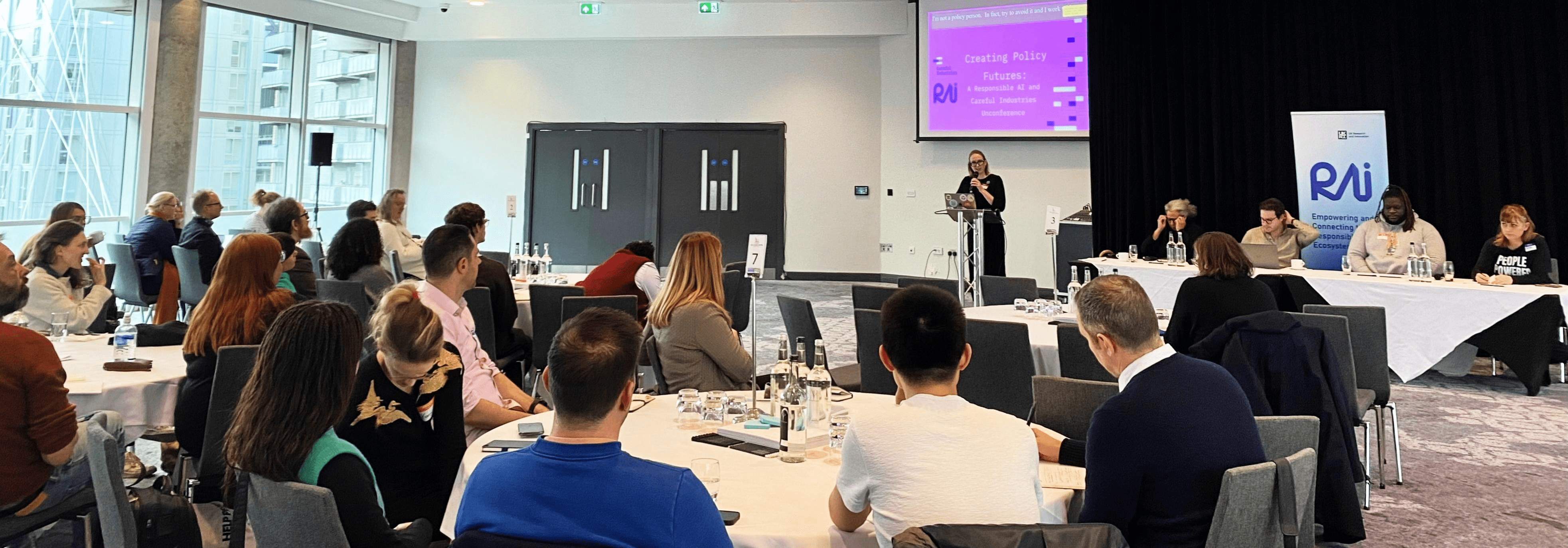On 19th November 2024, despite snowy conditions across the Midlands causing significant travel disruption, over 60 academics, researchers, industry specialists, and creative practitioners gathered at the Lowry Hotel in Manchester for the Creating Policy Futures: Responsible AI and Careful Industries Unconference. Expertly facilitated by Careful Trouble, the event brought together diverse voices to discuss and shape the future of AI policy within the cultural and creative industries.
The unconference began with thought-provoking opening provocations from Lex Fefegha (creative coder), Dr Erinma Ochu (UWE), and Adam Ingle (LEGO Group). Their insights set the stage for a participant-driven agenda, with attendees proposing discussion topics on issues such as:
- Copyright challenges and the implications of “opt-out” systems,
- How theatres are adapting to AI integration,
- Sustainability in creative industries,
- Grassroots resistance and public service approaches.
A lively panel discussion followed, featuring contributions from Mia Leslie (IFOW), Henry Cooke (BBC), and Julia Bell (Birkbeck). This session explored the nuances of AI policy, concluding with further participant-led discussions that delved into pressing issues, including technology adoption and ethical considerations.

Towards a Shared Vision for AI Policy
The discussions yielded a wealth of insights, which will inform a rapid response to the government’s Industrial Strategy 2035. These contributions will also serve as the foundation for a forthcoming whitepaper to be published in early 2025.
The UK’s creative industries, a sector contributing £126 billion annually to the economy, remain underrepresented in AI policy dialogue. This event aimed to address that gap by scrutinising the transformative potential of AI technologies and considering the wider implications of their rapid adoption. Key themes included intellectual property exploitation, skills development, and the ethical parameters for acceptable AI use.
During the event, participants examined critical questions, such as:
- What progress has been made in AI policy for cultural and creative industries?
- What constitutes acceptable and unacceptable practices in AI development and deployment?
- Where can consensus be found, and what should the priorities be?
Next Steps
The success of the unconference would not have been possible without the efforts of Rachel Coldicutt and Rachael Burton from Careful Trouble, the RAi and BRAID notetakers, and the support of King’s College London, which helped bring in dynamic speakers.
As the government invites input on its Industrial Strategy 2035, the creative and cultural sectors now have a timely opportunity to shape AI policy to reflect their unique needs and challenges. We look forward to sharing the whitepaper in the new year and continuing the dialogue on AI’s role in fostering innovation and sustainability in the creative industries.
Stay tuned for more updates as we work towards a shared vision for responsible AI development in the UK’s cultural and creative sectors!
Find out more about professional registration for:
Professionals working in the Creative Industries and Technologies
